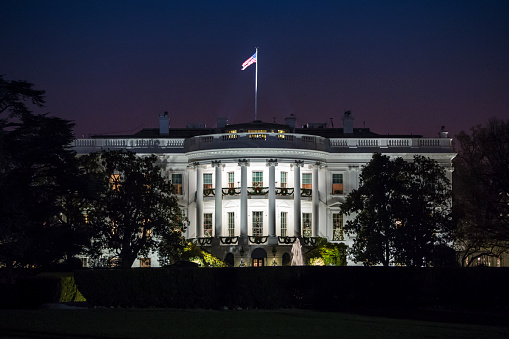In December 2016, Sen. John McCain (R-AZ) said that Russia’s attack on the US presidential election amounted to an “act of war.” A recap of summer highlights from the Trump-Russia Timeline reveals that it could be happening again — with Trump and his congressional allies aiding the assault.
Trump Solicits Foreign Dirt
Trump encourages foreign interference in America’s upcoming election — provided he’s the beneficiary.
– May 7-10, 2019: Trump’s personal lawyer Rudy Giuliani is planning to visit Ukraine with the intention of persuading its incoming government to pursue investigations that could help Trump’s re-election campaign. After advisers urge Ukraine’s new president not to meet with Giuliani, he abandons the trip.
- During the week of May 20: Giuliani instead meets in New York with a former Ukrainian diplomat as part of an aggressive effort to get dirt on Trump’s US political opponents.
- June 12: Trump declares publicly that he’s willing to accept a foreign government’s offer of dirt on a political opponent. He adds that FBI Director Christopher Wray is wrong in stating that a candidate receiving such an overture should call the FBI. The chair of the Federal Election Commission reminds all candidates that accepting foreign help is a crime.
- June 14: Trump tweets praise for Sen. Marsha Blackburn (R-TN) after she blocks legislation that would have required all federal candidates to report a foreign government’s offer of election assistance.
- June 28: At the G-20 summit in Osaka, a reporter asks Trump if he will tell Putin not to meddle in the US election. “Of course, I will,” Trump says. He turns to Putin, who is sitting next to him, and says with a smile, “Don’t meddle in the election.” Playfully, he wags his finger in the air and repeats, “Don’t meddle in the election.” Putin chuckles.
- July 23: Appearing before the Senate Judiciary Committee, FBI Director Christopher Wray testifies, “The Russians are absolutely intent on trying to interfere with our elections….”
- July 28: In a tweet, Trump announces the departure of Director of National Intelligence Dan Coats, who has been outspoken in warning about Russia’s past and ongoing election interference.
- Aug. 1: A reporter asks Trump about his July 31 phone call with Putin: “Mr. President, Robert Mueller said last week that Russia is interfering in the U.S. elections right now. Is that —
Trump interrupts, “Oh you don’t really believe this. Do you believe this? Ok, fine. We didn’t talk about it.”
- Aug. 20-22: Guiliani confirms that “over the past few weeks,” he has been pressuring Ukraine to investigate former Vice President Joe Biden’s family and the DNC — and he asserts that the US State Department has been helping him.
- Aug. 24-26, 2019: At the G-7 summit in France, Trump advocates on Putin’s behalf and says that he will invite him to the 2020 summit in the US. Other G-7 leaders object because Putin’s ongoing exclusion from the group has been retribution for Russia’s annexation of Crimea in 2014.
- Aug. 26 2019: As Giuliani pressures the Ukrainian government to develop dirt on Biden and the DNC, Trump delays the release of US military aid that Congress has appropriated to help Ukraine’s ongoing battle against Russian aggression.
- Sept. 2, 2019: After Mike Pence meets with Ukrainian President Volodymyr Zelensky in Warsaw, a reporter asks Pence whether he can assure Ukraine that Trump’s delay in military aid to that country is unrelated to Giuliani’s efforts to get dirt on Biden’s family from the Ukrainian government. Pence deflects: “[Zelensky and I] discussed America’s support for Ukraine and the upcoming decision the President will make on the latest tranche of financial support in great detail… As President Trump had me make clear, we have great concerns about issues of [Ukrainian] corruption.”
Senate Republicans Follow Trump’s Lead
Trump and his congressional allies — most notably Senate Majority Leader Mitch McConnell (R-KY) — are blocking efforts to defend against attacks on US elections.
- May 14: Gov. Ron DeSantis (R-FL) acknowledges that Russian hackers had gained access to voter databases in two Florida counties prior to the 2016 election, per a new briefing from the FBI and the Department of Homeland Security.
- June 7: McConnell continues to block Senate consideration of bipartisan legislation aimed at better securing American elections.
- July 24: Special counsel Robert Mueller testifies that Russia is continuing its efforts to interfere with US elections. Later that evening, Senate Republicans block two election security bills and a cybersecurity measure, earning McConnell the Twitter moniker #MoscowMitch.
- July 25: The Senate Intelligence Committee issues findings on Russia’s 2016 election attacks and the nation’s vulnerability to future attacks. The report observes that Russia targeted all 50 states and, in Illinois, “Russian cyberactors were in a position to delete or change voter data” in the voter database. It concludes, “Cybersecurity for electoral infrastructure at the state and local level was sorely lacking in 2016. Despite increased focus over the last three years, some of these vulnerabilities, including aging voting equipment, remain.”
A Founder’s’ Foresight
As Benjamin Franklin left the Constitutional Convention in 1787, a citizen of the new nation asked him, “Well, Doctor, what have we got — a republic or a monarchy?”
“A republic,” Franklin replied, “if you can keep it.”
He was speaking to all of us.
Steven J. Harper is a regular contributor to News & Guts and the creator/curator of the Trump-Russia Timeline. He’s an attorney, adjunct professor at Northwestern University Law School, and author of several books, including Crossing Hoffa — A Teamster’s Story and The Lawyer Bubble — A Profession in Crisis. He blogs at The Belly of the Beast. Follow him on Twitter (@StevenJHarper1).



